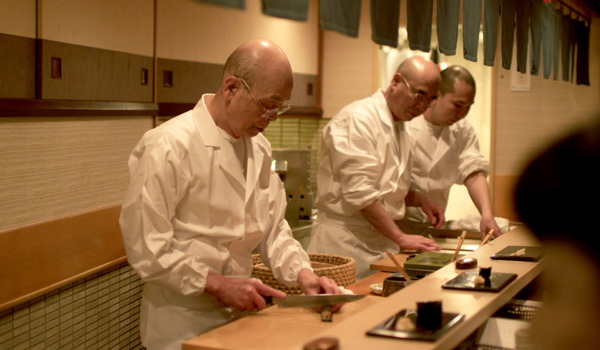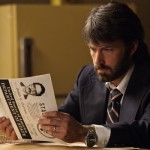Jiro Dreams of Sushi
There isn’t a sushi chef in the world more accomplished and admired than Japan’s Jiro Ono. The 85-year-old’s 10-seat Tokyo sushi bar, Sukiyabashi Jiro, is one of the world’s smallest establishments to be awarded three Michelin stars (the highest honor for restauranteurs). Director David Gelb’s documentary Jiro Dreams of Sushi follows the chef and gets pretty in-depth on his sushi-making process. Parts are actually fascinating (and mouth-watering!), but like another recent documentary, The Island President, our subject is a public figure with an image to maintain. There’s a sense that either Jiro or Gelb is holding back, and the portrait we’re ultimately presented feels more like a puff piece than something complete and three-dimensional.
That said, the sushi looks so damn good. I’m not even a sushi fan, but I’d eat at Jiro’s in a second (despite what’s apparently a steep price tag). What’s really interesting about Gelb’s film is how much he covers the inside-baseball elements of Jiro’s sushi business. We follow the old man to the market where he picks out the perfect fish and shrimp. He see him meeting with his rice vendor—the only man he trusts with this essential ingredient. We see his apprentices crisp their seaweed over an open flame. It’s cool stuff. That said, I couldn’t shake the feeling that this would have been a more interesting CBS Sunday Morning segment than a feature-length documentary.
What elevates Jiro Dreams of Sushi just beyond that level is the way Gelb approaches the Ono family dynamics. Yoshikazu Ono is the elder of Jiro’s two sons; He’s also his father’s most-trusted apprentice. Yoshikazu has been making world-class sushi for decades now (someone remarks late in the film that when the Michelin crew ate at Sukiyabashi Jiro, they only ate sushi made by Yoshikazu), but he’s stuck in the role of apprentice until his father retires. Most men (women apprentices aren’t discussed once) train for a decade—a long time for any occupation. Yoshikazu has been doing so for more than 30 years. His younger brother left (amicably) years ago to open his own place, but Yoshikazu says it is his duty to remain with his father, no matter how long it takes.
Gelb employs a few stylistic flourishes to establish tone. The music is rather melancholy, which hammers home both Yoshikazu’s unfulfillment and Jiro’s feelings toward life minus sushi. He states unequivocally that sushi is what he does best and that his life has little meaning outside these small bites of rice and raw fish. While that might be overstating it a bit (he does, after all, have two accomplished and well-adjusted sons), it’s one of the film’s few truly honest sentiments.
Visually, the film actually looks like a dream. Jiro and his team are always decked in white, and the rest of the restaurant isn’t much more colorful. Gelb uses slow motion a lot, and there’s even a shot that fades completely to white. It’s all very ethereal and gives the film a unique identity.
Should you watch Jiro Dreams of Sushi? I want to say “Yes!” because everyone should watch more documentary films. But this one is another relatively bland 2012 entry in the genre (after The Island President and Comic-Con Episode IV: A Fan’s Hope). So foodies: Watch and enjoy. The rest of you: Maybe pass on this one and check out a different doc.














